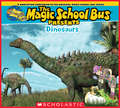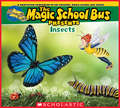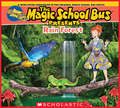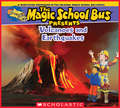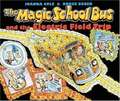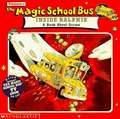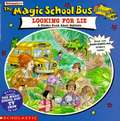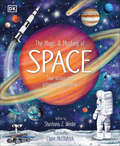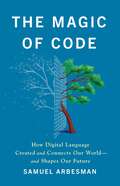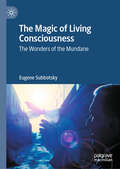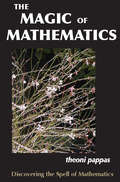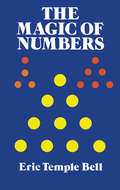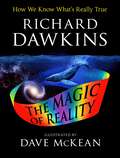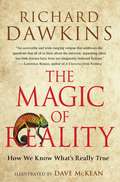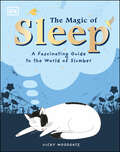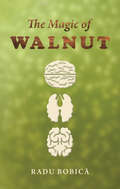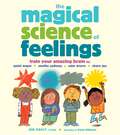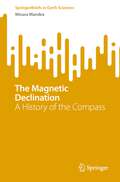- Table View
- List View
The Magic School Bus Presents: A Nonfiction Companion to the Original Magic School Bus Series (The Magic School Bus Presents)
by Tom JacksonTHE MAGIC SCHOOL BUS PRESENTS SEA CREATURES is a photographic nonfiction companion book to the original bestselling title, THE MAGIC SCHOOL BUS ON THE OCEAN FLOOR.ON THE OCEAN FLOOR taught thousands of kids about tides, coral reefs, and a whole host of marine animals. MAGIC SCHOOL BUS PRESENTS SEA CREATURES will expand upon the original title with fresh, updated, Common Core aligned content about all the incredible animals that live below the waves--from sharks and squid to whales, dolphins, and walruses. With vivid full-color photographs on each page as well as illustrations of the beloved Ms. Frizzle and her students, the Magic School Bus Presents series will enthrall a whole new generation of Magic School Bus readers.
The Magic School Bus Presents: A Nonfiction Companion to the Original Magic School Bus Series (The Magic School Bus Presents)
by Tom JacksonTHE MAGIC SCHOOL BUS PRESENTS PLANET EARTH is a photographic nonfiction companion book to the original bestselling title, THE MAGIC SCHOOL BUS INSIDE THE EARTH.INSIDE THE EARTH taught thousands of kids about Earth's crust, mantle, and core. MAGIC SCHOOL BUS PRESENTS PLANET EARTH will expand upon the original title with fresh, updated Common Core-aligned content about all the wonders of our planet. With vivid full-color photographs on each page and illustrations of the beloved Ms. Frizzle and her students, the Magic School Bus Presents series will enthrall a whole new generation of Magic School Bus readers.
The Magic School Bus Presents: Dinosaurs (The Magic School Bus Presents)
by Tom JacksonTHE MAGIC SCHOOL BUS PRESENTS DINOSAURS is a photographic nonfiction companion book to the original bestselling title, THE MAGIC SCHOOL BUS IN THE TIME OF THE DINOSAURS.IN THE TIME OF THE DINOSAURS from the bestselling Magic School Bus series taught thousands of kids about the T-rex, triceratops, and stegosaurus. MAGIC SCHOOL BUS PRESENTS DINOSAURS will expand upon the original title with fresh and updated content about all the incredible extinct creatures from millions and millions of years ago. With vivid full-color photographs on each page as well as illustrations of the beloved Ms. Frizzle and her students, the Magic School Bus Presents series will enthrall a whole new generation of Magic School Bus readers.
The Magic School Bus Presents: Insects (The Magic School Bus Presents)
by Tom JacksonTHE MAGIC SCHOOL BUS PRESENTS INSECTS is a photographic nonfiction companion book to the original bestselling title, THE MAGIC SCHOOL BUS INSIDE A BEEHIVE.INSIDE A BEEHIVE from the bestselling Magic School Bus series taught thousands of kids about bees. MAGIC SCHOOL BUS PRESENTS INSECTS will expand upon the original title with fresh and updated content about all the incredible insects flying and crawling around the earth. With vivid full-color photographs on each page as well as illustrations of the beloved Ms. Frizzle and her students, the Magic School Bus Presents series will enthrall a whole new generation of Magic School Bus readers.
The Magic School Bus Presents: The Rainforest (The Magic School Bus Presents)
by Tom JacksonTHE MAGIC SCHOOL BUS PRESENTS THE RAINFOREST stars Ms. Frizzle and her class and explores the plants and animals of our planet's rainforests.The bestselling Magic School Bus series has taught thousands of kids about everything from oceans to space to dinosaurs. MAGIC SCHOOL BUS PRESENTS THE RAINFOREST will expand upon the original titles with fresh and updated content about all of the incredible plants and animals that live in the world's rainforests. With vivid full-color photographs on each page as well as illustrations of the beloved Ms. Frizzle and her students, the Magic School Bus Presents series will enthrall a whole new generation of Magic School Bus readers.
The Magic School Bus Presents: Volcanoes & Earthquakes (The Magic School Bus Presents)
by Tom JacksonTHE MAGIC SCHOOL BUS PRESENTS VOLCANOES & EARTHQUAKES is a photographic nonfiction companion book to the original bestselling title, THE MAGIC SCHOOL BUS INSIDE THE EARTH.INSIDE THE EARTH from the bestselling Magic School Bus series taught thousands of kids about rocks, volcanoes, and the earth's core. MAGIC SCHOOL BUS PRESENTS VOLCANOES & EARTHQUAKES will expand upon the original title with fresh and updated content. MAGIC SCHOOL BUS PRESENTS VOLCANOES AND EARTHQUAKES will explore the explosive and earth-shattering forces of our planet. With vivid full-color photographs on each page as well as illustrations of the beloved Ms. Frizzle and her students, the Magic School Bus Presents series will enthrall a whole new generation of Magic School Bus readers.
The Magic School Bus and the Electric Field Trip
by Joanna ColeSmall enough to squeeze through power lines, Ms. Frizzle's class learns how electric current travels through the town, lights up a light bulb, heats up a toaster, and runs an electric motor. Fans of the Magic School Bus won't be left behind by this simple and informative introduction to the generation and distribution of electricity. This book has picture descriptions.Also please note: where the book has two dashes instead of an em dash, I left two dashes; where the book has an em dash, I made an em dash.
The Magic School Bus: A Book About Germs (The Magic School Bus)
by Beth NadlerRalphie's sick and can't host the Frizzle News Network TV show on health--until Ms. Frizzle and the gang travel inside his bloodstream to learn how the human body fights germs.
The Magic School Bus: Inside the Human Body
by Joanna Cole Bruce DegenTo celebrate its 20th anniversary, Scholastic is re-releasing the ten original Magic School Bus titles in paperback. With updated scientific information, the bestselling science series ever is back! Arnold has swallowed the Magic School Bus! Now, instead of seeing an exhibit of the human body at a museum, the class is taking a look at Arnold's stomach, his intestines, his bloodstream, and more from the inside on this heart-stopping fieldtrip - one the reluctant Arnold would be happy to miss.
The Magic School Bus: Looking For Liz
by Joanna ColeThe class takes the magic school bus to various animal habitats.
The Magic School Bus: Lost In The Solar System
by Joanna ColeOn a special field trip in the magic school bus, Ms. Frizzle's class goes into outer space and visits each planet in the solar system.
The Magic and Mystery of Space: Tour Across Our Astounding Universe (The Magic and Mystery of the Natural World)
by Shoshana WeiderEnter the world of amazing planets, swirling nebulae, and distant galaxies for an unforgettable journey through space.The Magic and Mystery of Space combines vivid illustrations with dazzling and up-to-date photography to help young scientists aged 7-9 learn all there is to know about space.Children will love to learn about the planets in our Solar System and distant black holes as they discover incredible facts and journey through space. This space guide features fascinating topics, like how stars die, what scientists do in space, and what life could look like on other planets.This space book for kids offers: A new and updated edition in the popular Magic and Mystery of series with all the latest facts and images.Striking illustrations by Claire McElfatrick, who has illustrated all the books in this series, combined with fascinating photography and expert CGIs.Material written by an expert space and science communicator, who is passionate about educating children about the cosmos.Core topics for 7–9 year olds, including planets, the Solar System, space missions, and plenty of space facts.The Magic and Mystery of Space brings the cosmos closer to home. Children will see incredible views from space telescopes, discover what it’s like walking on the Moon, and learn how to star-gaze. They’ll even get to meet some of the animals who have been to space! Filled with facts and fun, this book presents a beautiful and new take on space and is perfect for any young space lovers or future astronauts.
The Magic of Code: How Digital Language Created and Connects Our World—and Shapes Our Future
by Samuel ArbesmanIn the tradition of classics such as The Lives of a Cell, a bold reframing of our relationship with technology that argues code is "a universal force—swirling through disciplines, absorbing ideas, and connecting worlds" (Linda Liukas). In the digital world, code is the essential primary building block, the equivalent of the cell or DNA in the biological sphere—and almost as mysterious. Code can create entire worlds, real and virtual; it allows us to connect instantly to people and places around the globe; and it performs tasks that were once only possible in science fiction. It is a superpower, and not just in a technical sense. It is also a gateway to ideas. As vividly illustrated by Samuel Arbesman, it is the ultimate connector, providing new insight and meaning into how everything from language and mythology to biblical texts, biology, and even our patterns of thought connect with the history and nature of computing. While the building block of code can be used for many wondrous things it can also create deeper wedges in our society and be weaponized to cause damage to our planet or our civilization. Code and computing are too important to be left to the tech community; it is essential that each of us engage with it. And we fail to understand it to our detriment. By providing us with a framework to think about coding and its effects upon the world and placing the past, current, and future developments in computing into its broader setting we see how software and computers can work for people as opposed to against our needs. With this deeper understanding into the &“why&” of coding we can be masters of technology rather than its subjects.
The Magic of Light and Sound
by Rebecca L. JohnsonExplores the roles that light and sound waves play in our everyday lives and how bats and fireflies use light and sound. Learn how these energy waves play a role in everything from modern medicine to music.
The Magic of Living Consciousness: The Wonders of the Mundane
by Eugene SubbotskyThis book demystifies the notion of living consciousness and aims to show that, far from being a mere accompaniment to brain functions, living consciousness defines the features of both physical objects and human artifacts. The distinction is between living consciousness, which includes subjective experiences ‘here and now’ (e.g., perceptions, feelings, imagination, and creative thinking) and conforms to the laws of magic, versus objectified consciousness that comprises physical (e.g., computers) and symbolic (e.g., languages and concepts) human artifacts and conforms to the laws of nature and formal logic.The magnificent success of science in the modern world has plunged many scientists into the illusion that magical events are ancient history and exist today only in art and night dreams. The illusion reached its pinnacle in the middle of the 20th century, when nuclear power stations, flights to the Moon, early computers, genetic engineering and other wonders of science made some scientists believe that there is nothing in the world that cannot be explained by science. But there was a price to pay for this scientific optimism – the scientists became blind to their living consciousness. They began looking at the world as if nature and objectified consciousness were the only things that mattered, with living consciousness being viewed as a mundane thing that accompanies brain processes but has no causal powers.This book examines how our living consciousness works, and how our understanding of this work helps in solving key problems of modern life, such as facilitating creativity, protecting from magical manipulation with minds, fighting certain kinds of crime, managing fake reality, preventing misuses in psychotherapy and other psychological practices, comprehending controversial issues in science, and tracing origins of totalitarian media narratives that trigger hatred and wars.
The Magic of Mathematics
by Theoni PappasDelves into the world of ideas, explores the spell mathematics casts on our lives, and helps you discover mathematics where you least expect it. Be spellbound by the mathematical designs found in nature. Learn how knots may untie the mysteries of life. Be mesmerized by the computer revolution. Discover how the hidden forces of mathematics -hold architectural structures together -connect your telephone calls -help airplanes get off the ground - solve the mysteries of the living cell. See how some artists use a mathematical palette in their works and how many writers draw upon the wealth of its ideas. Experience all this in The Magic of Mathematics.
The Magic of Numbers
by Eric Temple BellFrom one of the foremost interpreters for lay readers of the history and meaning of mathematics: a stimulating account of the origins of mathematical thought and the development of numerical theory. It probes the work of Pythagoras, Galileo, Berkeley, Einstein, and others, exploring how "number magic" has influenced religion, philosophy, science, and mathematics
The Magic of Reality: How We Know What's Really True
by Richard DawkinsMagic takes many forms. Supernatural magic is what our ancestors used in order to explain the world before they developed the scientific method. The ancient Egyptians explained the night by suggesting the goddess Nut swallowed the sun. The Vikings believed a rainbow was the gods’ bridge to earth. The Japanese used to explain earthquakes by conjuring a gigantic catfish that carried the world on its back—earthquakes occurred each time it flipped its tail. These are magical, extraordinary tales. But there is another kind of magic, and it lies in the exhilaration of discovering the real answers to these questions. It is the magic of reality—science. Packed with clever thought experiments, dazzling illustrations and jaw-dropping facts, The Magic of Reality explains a stunningly wide range of natural phenomena. What is stuff made of? How old is the universe? Why do the continents look like disconnected pieces of a puzzle? What causes tsunamis? Why are there so many kinds of plants and animals? Who was the first man, or woman? This is a page-turning, graphic detective story that not only mines all the sciences for its clues but primes the reader to think like a scientist as well. Richard Dawkins, the world’s most famous evolutionary biologist and one of science education’s most passionate advocates, has spent his career elucidating the wonders of science for adult readers. But now, in a dramatic departure, he has teamed up with acclaimed artist Dave McKean and used his unrivaled explanatory powers to share the magic of science with readers of all ages. This is a treasure trove for anyone who has ever wondered how the world works. Dawkins and McKean have created an illustrated guide to the secrets of our world—and the universe beyond—that will entertain and inform for years to come.
The Magic of Reality: How We Know What's Really True
by Richard DawkinsAn elegant, text-only edition of the New York Times bestseller that&’s been hailed as the definitive authority on…everything.Richard Dawkins, bestselling author and the world&’s most celebrated evolutionary biologist, has spent his career elucidating the many wonders of science. Here, he takes a broader approach and uses his unrivaled explanatory powers to illuminate the ways in which the world really works. Filled with clever thought experiments and jaw-dropping facts, The Magic of Reality explains a stunningly wide range of natural phenomena: How old is the universe? Why do the continents look like disconnected pieces of a jigsaw puzzle? What causes tsunamis? Why are there so many kinds of plants and animals? Who was the first man, or woman? Starting with the magical, mythical explanations for the wonders of nature, Dawkins reveals the exhilarating scientific truths behind these occurrences. This is a page-turning detective story that not only mines all the sciences for its clues but primes the reader to think like a scientist as well.
The Magic of Sleep: A fascinating guide to the world of slumber (The Magic of...)
by Vicky WoodgateDive into the weird and wonderful world of sleep, from the science behind dreams to a peek into animal sleeping habits, in this incredible book for children aged 7 to 9. We spend about 26 years of our lives sleeping, but how much do you really know about what happens when your head hits the pillow? This book answers all your questions about what goes on in your head when you snooze, including the difference between light and deep sleep, where dreams come from, and how essential sleep is to staying healthy. Discover fascinating facts about how people slept in the past, and how people sleep in different ways around the world. Did you know that the oldest mattress was found in South Africa and is 77,000 years old? Vivid illustrations by Vicky Woodgate bring the topic to life. As well as humans, learn about the sleeping habits of other animals, from bears hibernating to how bats sleep upside down. Even plants sleep! Finally, learn how you can get a proper night's sleep with practical tips and ideas for meditation to calm your mind before bedtime. This book is ideal for children who have difficulty getting to sleep, as well as anyone who wants to learn more about how our brains and bodies work.
The Magic of Walnut
by Radu BobicᾰDiscover the hidden potential of the walnut tree – nature’s very own pharmacy, whose benefits have been known since antiquity. From its use in house and furniture building, where it is regarded as a true aristocrat among woods, to its pharmaceutical properties, every part of this tree has a valuable purpose. But did you know that a mere 28g of walnut kernel provides 7g of protein – equivalent to 13% of your recommended daily intake? No wonder it’s nicknamed ‘the vegetarian meat’. And as well as its popularity as a nutritious snack, the walnut has many culinary uses. Try some of the recipes in this book to find out for yourself! Don’t miss out on the true power of the walnut – unlock its benefits for a healthier you.
The Magical Science of Feelings: Train Your Amazing Brain to Quiet Anger, Soothe Sadness, Calm Worry, and Share Joy
by Jen DailyClinical social worker Jen Daily helps kids understand the science behind feelings, taking them on a lively tour of the brain to see where anger, anxiety, sadness, and joy start, and offering activities for calming emotions. Where do feelings come from? Are they magic? No, they're science! There is a reason our tummies feel funny when we are worried, and why we want to stomp and clench our fists when we feel mad. With endearing illustrations, the parts of the brain come alive as friendly characters who explain how emotions like happy, sad, mad, worried, and overwhelmed are created in the body. Along with clear explanations about the origins of feelings, author and clinical social worker Jen Daily provides creative coping skills and activities (playfully called emotion potions) that help build a child's ability to reflect, cope, calm anxious thoughts, and welcome greater joy. From dancing to storytelling and meditation, the coping skills are accessible and effective for a wide range of social-emotional needs and learning styles.
The Magick of Matter: Crystals, Chaos and the Wizardry of Physics
by Felix Flicker'This is a book about wizardry. It will reveal the secrets of the wizard's art, and how you, too, can learn to follow them. It is a history of magic'Condensed matter physics is what happens when atoms cluster together to make something of a size we can understand - something like a car, say, rather than a galaxy. It's what makes things hover in mid-air (magnetic levitation) or crystals glow (thermoluminescence). It's also what we mean by magick.Join Felix Flicker on an empirical adventure in condensed matter physics, the scientific mechanism behind the mysteries of alchemy, transmogrification, and much more. This is the one-stop guide on how to harness the enigmatic workings of the natural world to become a thoroughly modern wizard.From the laws of thermodynamics to the seven bridges of Konigsberg, The Magick of Matter is a journey of discovery which will upend everything you think you know about witchcraft, wizardry, and condensed matter physics.
The Magick of Physics: Uncovering the Fantastical Phenomena in Everyday Life
by Felix FlickerAn award-winning Oxford physicist draws on classic sci-fi, fantasy fiction, and everyday phenomena to explain and celebrate the magical properties of the world around us.If you were to present the feats of modern science to someone from the past, those feats would surely be considered magic. Theoretical physicist Felix Flicker proves that they are indeed magic—just familiar magic. The name for this magic is &“condensed matter physics.&” Most people haven&’t heard of the field, yet more than a third of physicists identify as condensed matter researchers, making it the most active area in the subject—with good reason. Condensed matter is the solids, liquids, and gasses that surround us—and the more exotic matters—which dictate every aspect of our present existence, and hold the keys to a brighter future, from quantum computing to real-life invisibility cloaks. Flicker teases out the magical threads that run through our daily lives. Condensed matter physics allows you to create anything abiding by the laws of reality—and often, we find that those laws can be bent. Flicker explains how to create new particles which never existed before, how to make crystals shoot out such intense light they can cut through metal, how to separate the poles of a magnet. And more. The book&’s endearing conceit is that you, the reader, are an aspiring wizard whose ability to cast spells (i.e. to do science) is dependent on your grasp of the fundamentals of our universe. This book contains no equations or charts—instead, it&’s full of owls and mountains and infinite libraries, and staffs and wands, and martial arts and mythical islands ruled by sage knot-makers. Part of the book&’s magic is that, for all these fanciful trappings, it still feels practical and applicable. The Magick of Physics will open your eyes to the miracles that surround us.
The Magnetic Declination: A History of the Compass (SpringerBriefs in Earth Sciences)
by Mioara MandeaThis book aims then to describe in a comprehensible way efforts made over centuries of measuring and understanding the magnetic declination. The book also highlights some important characteristics of the Earth’s magnetic field thanks to the declination measurements. Some applications and societal implications are also underlined. Anyone living in the 21st century knows the best way to navigate is by using a smartphone App. Decades and centuries ago, in order to find the same way a magnificent instrument was used: the compass. Despite many being aware of the compass, not everyone appreciates that throughout the ages of exploration, sailors and explorers linked their lives and great discoveries to the magnetic needle. Furthermore, is there an awareness of the Earth’s physical mechanism behind the changes in time and space of the direction indicated by the compass? The magnetic declination is at the center of this book and it helps the reader to understand how to navigate in time and space. The book provides the history of the compass and magnetic declination leading the reader to the understanding of our magnetic planet.This book is designed for those who are fascinated by the long history of geomagnetism. This book relies on reader’s knowledge of elementary scientific concepts, and introduces the geomagnetism concepts as they evaluated in time. The focus is on some basic concepts and physical processes in order to understand the evolution of a specific element of the geomagnetic field, the declination. The primary audience may have just started an interest in the geomagnetism and history of science, as students and researchers. Some readers may have an interest that only touches the geomagnetism, as navigators, geophysicists, historians.


